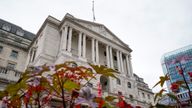One small step for rates, a major watershed for Bank of England
Nothing, let’s face it, feels especially normal right now.
The country facing record infection numbers in a pandemic which has already broken pretty much all precedents.
The economy facing a crunch as people abandon restaurants and pubs.
And all the while, the cost of living is rising to unfamiliar levels.
And the Bank of England decision to raise interest rates today was also not in any way what you’d consider to be “normal”.
Generally speaking, central banks increase borrowing costs when the economy is running hot.
Since it’s their job to keep inflation under control and since inflation is often high at such points, interest rates going up is often a sign of good news: a signal of recovery.
But this feels, well, different.
This time around, the Bank’s Monetary Policy Committee has voted to increase interest rates at a time of extraordinary uncertainty.
There are many economists who suspect that economic output is shrinking right now – in other words, Britain may be contracting for the first time since the previous lockdown.
Many households are facing a perilous squeeze, with energy costs rising rapidly even as benefit support is withdrawn.
Some sectors of the economy – especially hospitality – are experiencing a collapse in demand.
This is not, in other words, an economy that looks especially “hot” right now.
Yet still the Bank increased interest rates. Why?
The short answer, to judge from the governor’s comments and the minutes released today, is that for them the risks of inflation – up to 5.1% in November – outweigh the risks to the economy from Omicron.
Whether that proves to be the right call remains to be seen, but the decision is nonetheless a big one.
Not big, it should be said, in terms of percentage points.
This 0.15 per cent increase is tiny by historical standards.
At 0.25 per cent, rates are still far lower than they have been for most of the Bank’s 300-year history.
And since a near-record proportion of people are on fixed rather than floating rate mortgages, the instant impact on most households will be minimal.
But even accounting for that, this is nonetheless a watershed, since an initial rate hike often (though not always) implies the beginning of a “tightening cycle”, where the Bank carries on raising rates until it is satisfied it has done enough to bring inflation under control.
In other words, this is only the beginning.
And coming at the very same time as the government tightens fiscal policy by raising taxes, it implies that both feet will be firmly planted on the economic brake pedal in the coming months.




